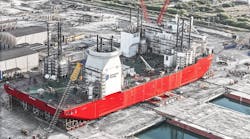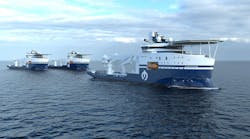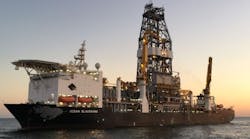Editor's note: This story first appeared in the November-December 2022 issue of Offshore magazine. Click here to view the full issue.
By Justin Smith, S&P Global
While the construction of offshore drilling rigs remains very slow with still no orders being placed, at least some newbuild units that have been sitting in yards, for years in some cases, are being delivered as demand has improved. Currently, there are a total of 52 rigs are under construction, and jackups comprise exactly half of those units with 26.
As such, the combined number of drillships, semis, and tenders currently being built also totals 26, of which there are 15, 7, and 4 under construction, respectively. Out of these 52 rigs, only seven were ordered with contracts in hand or by operators themselves. Four of those rigs, however, are part of Sete Brasil and those original charters were cancelled years ago by now with no tangible sign of them getting re-awarded anytime soon.
Considering the flat state of the construction market, it stands to reason that Chinese shipyards continue to have more rigs under construction than yards in other countries. At the moment, a total of 23 rigs are being built in yards in China, 14 of which are jackups, while of the four tender rigs under construction globally, three are in China. Similarly, shipyards in Singapore also remain focused on jackups, with 10 of the 15 units under construction there now being jackups.
South Korean shipyards are only working on drillships at the moment with all eight rigs being built in the country currently being of that type, although that is two fewer than last year as a couple of rig deliveries have happened, albeit at a very slow pace. Those eight drillships in South Korea account for over half of the 15 drillships under construction worldwide, and 36% of all the floaters when one adds in the seven semis being built globally.
Speaking of deliveries, 12 rigs were scheduled for delivery this year, with 29 more on the books for next year; seven scheduled for 2024; and the final four are penciled in for 2025. However, it should be noted that it is unlikely that many of these rigs will be delivered as planned, particularly those scheduled for 2022, as has been the case with deferred deliveries over the past few years.
Nearly all of the rigs currently being built were ordered speculatively, and very few have actually picked up a contract in the time since construction started. Of the 45 speculative units currently being built, a mere five have been awarded contracts since construction started: one drillship in Singapore and four jackups in China. The drillship charter is for a rig being built by Jurong Shipyard in Singapore for Transocean, and it is one of two new semis designated for work in the deepwater US Gulf of Mexico for a 20K psi project. Deepwater Titan is scheduled to start its five-year charter with Chevron in 2Q 2023 when it will be working on the Anchor field. Sister rig Deepwater Atlas has already been delivered from the yard, and started operations this past October with Beacon Offshore Energy on the Shenandoah field, initially using dual BOPs rated to 15,000 psi for around 255 days. After that, a 20,000 psi BOP will be installed over about two months, after which it will start the second phase of 275 days performing well completions.
However, much more telling of a recent trend this year are those four newbuild jackups that have lined up contracts, all of which are slated to go to the Middle East to work for Saudi Aramco. The Saudi operator has been expanding its rig fleet in recent months and has plans to expand it further, potentially adding up to 40 more jackups to its fleet over the next couple years. The bulk of these units are being supplied by stacked rigs that have not worked much, if at all, over the last few years, but they are also picking up newbuilds that have been sitting in yards in Asia, mostly China, after being abandoned by the contractors that originally ordered them.
To that end, as has been the case for years now, contractors and shipyards continue to put under-construction units on standby to wait out the industry’s prolonged downturn. At the moment, 32 rigs that are somewhere in the process of being built are now on standby, and many of these units are ostensibly complete. Of those 32 units, 10 are jackups, 12 are drillships, and six are semis, as well as all four tenders that are being built. While not always officially on standby, every single rig currently being built has had its delivery pushed out, with the shortest delay being 10 months and the longest being around a decade.
However, it is worth noting that while most of those figures are very similar to the previous few years, the jackup number has come down considerably, as there were 18 on standby at this time last year, compared to 10 now. This trend goes hand-in-hand with the eruption in demand coming from the Middle East as mentioned above. For example, ADNOC Drilling acquired two newbuild jackups from China Merchant Heavy Industry’s shipyard, namely Mezhem (ex-Fortune/Shelf Drilling Fortune/Bestford JU Tbn3) and Bateel (ex-Victory/Shelf Drilling Victory/Bestford JU Tbn4). The rigs are two of many that have been recently acquired by the contractor as part of its fleet expansion plan in support of operator ADNOC’s upstream growth plans.
As has been the case for years now, the number of new rig orders being placed remains bottomed out with almost no new orders since 2015. This should not come as a surprise, however, considering that the market is still oversupplied and, while demand has been improving globally, it has not been enough to overcome existing supply, including unfinished newbuilds. Between 2015 and thus far into 2022, only eight rigs have been ordered. Zero orders were placed in either 2016 or 2017, followed by three orders over the next two years, all for semis. Two jackups were ordered by ARO Drilling in Saudi Arabia in 2020, but the pace returned to no orders in 2021 or so far this year.
With so many rigs that have had their construction stalled, contractors keep delaying the deliveries of their rigs and, in some cases, the shipyards themselves end up becoming the owner. To address this challenge, some shipyards have begun to engage in new business activities like marketing vessels. Keppel, for example, is not just actively engaging buyers to offload rigs, but has also agreed to a number of bareboat charters.
To that end, Keppel secured bareboat agreements worth US $87 million (SGD $120 million) with Arabian Drilling for two newbuilds then-called Clearwater JU Tbn4 and Fecon 3, which have been renamed Arabdrill 110 and Arabdrill 120, respectively. The contractor has already obtained these rigs on three-year firm charters, plus a one-year option, for each of these units, for work under a Saudi Aramco drilling program. This program was scheduled to commence in 4Q 2022. Similarly, Advanced Energy Systems has bareboat-chartered two newbuild jackups from Keppel FELS to work for Saudi Aramco. The units, Admarine 683 (ex-Fecon-1) and Admarine 684 (ex-Fecon-2), are scheduled to start their five-year firm jobs, with two-year options, in the fourth quarter as well. Meanwhile, newbuild jackup Perro Negro 11 will start its own five-year job with Saudi Aramco under a bareboat charter agreement between contractor Saipem and shipyard (and the rig’s owner) CIMC Raffles.
In response to this increase in jackup demand, Borr Drilling recently suggested that the delivery of the two remaining unsold newbuild units that are yet to be delivered – Vale and Var – could be accelerated. Earlier this year, under a refinancing agreement with Keppel FELS, Borr had deferred the delivery of the two units to July 2025 for Vale and September 2025 for Var. With the jackup market tightening, this could now be brought forward to earlier in 2025.
However, even getting a contract is not a guarantee that a newbuild rig trapped in a yard will be able to be delivered. Following a tender that lasted nearly a year, on Dec. 31, 2020, SacAnb Offshore won a three-year contract from Petrobras for newbuild semi Sevan Developer, construction of which started way back in 2011 but has been on standby at Cosco Shipyard in Qidong, China, since 2014. Petrobras ultimately terminated the charter, which came with a three-year option and a day rate of approximately US $120,000, with China’s COVID-19 rules at least partially being blamed for hindering efforts to ready the rig. The Sevan 650 monohull design unit was scheduled to be in Brazil around the third quarter of 2021, but that never happened.
As with jackups, shipyards are doing what they can to sell idle newbuild floaters. One such buyer was Turkish operator TPAO, which purchased drillship Cobalt Explorer from Daewoo Shipbuilding & Marine Engineering (DSME) in November 2021. The rig's original contract for Vantage Drilling was terminated in 2015. DSME then agreed to sell the rig to Northern Drilling in May 2019 but it was cancelled later that same year. Following the deal with TPAO, the rig was delivered in February and has since been renamed Abdulhamid Han before beginning to work in mid-August. TPAO already owns three other drillships that it uses in the Black Sea and Mediterranean Sea, but all of those were rigs that had been in the drilling market for years and worked around the world.
Meanwhile, Samsung Heavy Industries (SHI) is looking to sell the remaining four completed but undelivered drillships still at its yards for a combined KRW 1.04 trillion won (US $840 million). SHI will be participating as an investor for the deal with a Seoul-based private equity firm called Curious Partners. The four drillships are Crete, Dorada, Draco, and Zonda. For one of the units, understood to be Crete (ex-Ocean Rig Crete), SHI has a purchase option agreement with Stena Drilling. Assuming the deal goes through, Crete will be renamed Stena Evolution.








